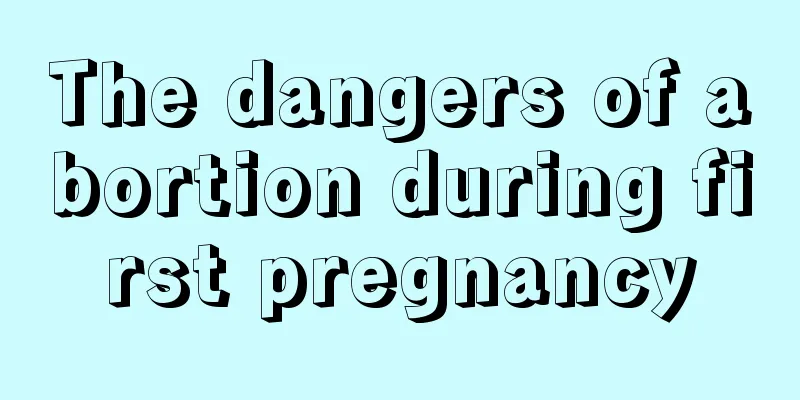The dangers of abortion during first pregnancy

|
Today's society is relatively open, and many people start living together before getting married. This phenomenon is very common. When an unexpected pregnancy occurs, many people choose to end the pregnancy by abortion. Although today's abortion technology is very advanced, it still has an impact on women's bodies, which is something you must know. So, what are the dangers of abortion during the first pregnancy? Let’s take a look below. 1. Uterine blood accumulation after painless abortion Intrauterine hemorrhage often occurs within a few hours after abortion. Patients with abortion experience unbearable abdominal pain. Gynecological examination reveals that the uterus is significantly enlarged, soft, and tender. At this time, immediate curettage is needed to clear the blood in the uterine cavity, and oxytocin and antibiotics should be given. 2. Uterine perforation after painless abortion Uterine perforation is a very serious complication that occurs during abortion surgery. Most patients experience sudden and severe abdominal pain during perforation, but a small number of people may not feel any obvious pain. The abdominal pain caused by uterine perforation is persistent and there is a small amount of vaginal bleeding. If the perforation is small and there is no damage to internal organs such as the bladder and rectum, and there is no internal bleeding, conservative treatment can be used. If there is still residual tissue in the uterine cavity, uterine curettage can be performed after the condition has improved. 3. Infection after painless abortion This is one of the most common short-term complications of abortion. Post-abortion infection often occurs within two weeks after the operation and can be directly caused by the abortion operation. It usually causes acute pelvic inflammatory disease, with severe abdominal pain that is persistent and may worsen in paroxysmal forms, accompanied by fever, chills, or yellow discharge. This is the main cause of lower abdominal distension and pain after abortion. During physical examination, the abdominal pain is resistant to pressure, and there is tenderness and rebound pain. Gynecological examination revealed cervical tenderness and uterine body tenderness, with obvious tenderness. Things to note after abortion 1. Pay attention to rest and strengthen nutrition. After the abortion, you should rest in bed for 2-3 days, then you can get out of bed and move around, gradually increasing the activity time. Do not engage in heavy physical labor or work in cold water within half a month after the abortion to avoid catching cold. Pay attention to increasing nutrition, eat more protein-rich foods such as fish, meat, eggs, bean products, and fresh vegetables rich in vitamins to promote early repair of damaged organs. 2. Keep the vulva clean and strictly prohibit sexual intercourse. After an abortion, the cervix has not completely closed and the endometrium also has a repair process. During this period, special attention should be paid to keeping the vulva clean and hygienic. The sanitary napkins and underwear used should be washed and changed frequently. Do not take a sitz bath within half a month after the operation to prevent dirty water from entering the vagina and causing infection. If you have sexual intercourse too early after an abortion, it can easily cause acute endometritis, pelvic inflammatory disease, and may also lead to secondary infertility. Therefore, sexual intercourse is strictly prohibited within one month after the abortion. 3. Observe the bleeding situation. If vaginal bleeding lasts for more than one week after an abortion, or is even accompanied by lower abdominal pain, fever, turbid and smelly leucorrhea, and other abnormal symptoms, you should go to the hospital for a follow-up visit in time. 4. Adhere to contraception. After abortion, the ovarian and uterine functions gradually recover, and the ovaries ovulate on schedule. If you do not persist in contraception, you will get pregnant again soon. Therefore, after an abortion, you should choose reliable contraceptive measures as soon as possible, and you must insist on contraception as the main method. You cannot use abortion as a contraceptive measure. |
<<: What happens if I only have brown discharge during my period?
>>: What is the cause of a small amount of brown discharge before menstruation?
Recommend
Do you know how to choose the right bra for yourself?
A study found that only 29% of women choose a bra...
Functional uterine bleeding
Important reminder: Dysfunctional uterine bleedin...
What are the symptoms of complete miscarriage?
Many women often experience incomplete miscarriag...
Is it good to buy Gannan navel oranges online? What are the disadvantages of buying Gannan navel oranges online?
We all know that oranges are rich in vitamins, mi...
What is the situation of right side abdominal pain in pregnant women
It is normal for pregnant women to experience pai...
Oath: Survey Report on Video Preferences of American Millennials
American millennials typically watch comedies, ac...
Does the plateau climate suppress the new coronavirus? Why is there little new pneumonia in the plateau area?
The new coronavirus has been spreading quite badl...
Vulvar allergy has these symptoms, be careful
Many people's vaginas do not have allergies, ...
Which department should I go to for amniocentesis?
Amniocentesis is a common diagnostic examination ...
Can I eat fish tofu during menstruation?
The nutritional value of fish tofu is very high b...
What are the advantages and disadvantages of drinking chicken soup regularly? Can you drink chicken soup after giving birth?
Chicken soup is not only delicious, but also nutr...
When is the earliest sign of pregnancy?
You have to understand that in daily life, everyo...
Can I use moxibustion after miscarriage?
After women become pregnant, if the couple are re...
National Children's Vaccination Day | Vaccines have serious side effects and will affect children's IQ development? These rumors are really harmful
April 25, 2024 is the 38th National Children'...
Causes of anal pain in adenomyosis
Patients with adenomyosis almost feel that life i...









